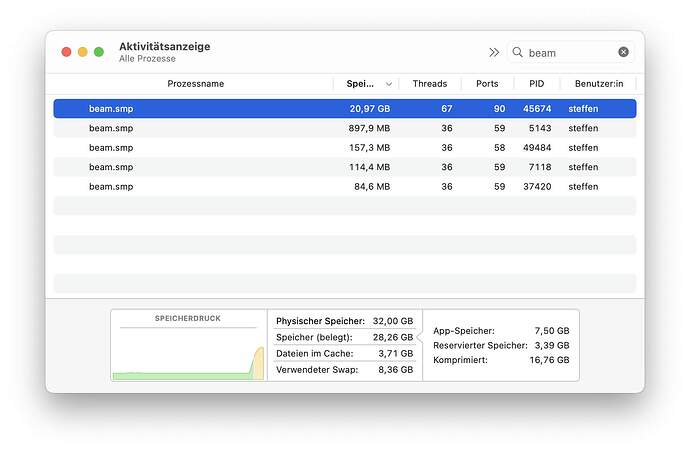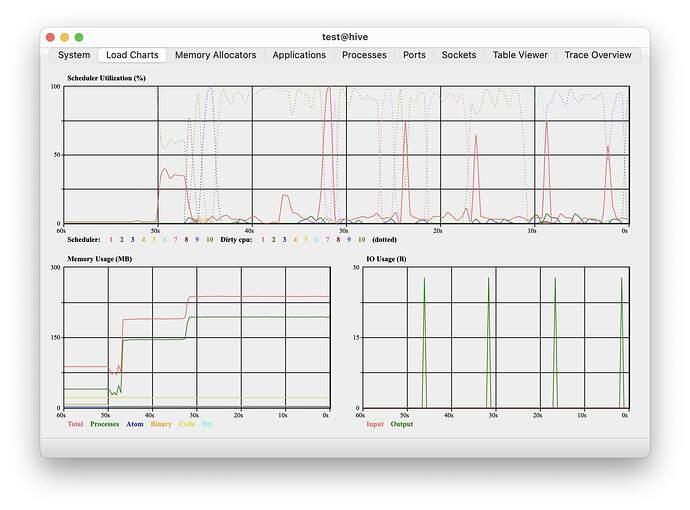Hey there,
I’m currently benchmarking some sentence transformers (see Nx vs. Python performance for sentence-transformer encoding) and stumbled upon something weird:
Basically I’m encoding a sentence into a vector using Bumblebee (Nx+EXLA) and then calculate a cosine similarity with a list of pre-calculated vectors (~150k). I’m benchmarking the whole process to see what performance I can achieve:
[%{embedding: query}] = Nx.Serving.batched_run(SentenceTransformer, ["this is a test input"])
sim =
for chunk <- vectors do
Bumblebee.Utils.Nx.cosine_similarity(query, chunk)
end
|> Nx.concatenate()
{similarity, labels} = Nx.top_k(sim, k: 10)
indexes = Nx.to_flat_list(labels)
scores = Nx.to_flat_list(similarity)
for {idx, score} <- Enum.zip(indexes, scores) do
# accessing the sentence_map here leads to the issue
%{sentence: sentence_map[idx], score: score}
end
This works fine until I try to map the resulting top k indexes back to the sentences using a 150k key map of index → sentence entries. When doing this, EXLA suddenly starts to consume a LOT of memory:
I think that the memory usage is in EXLA as is not visible in the observer:
Running on CUDA seems to confirm this, it even runs out of memory completely:
This is my script to reproduce:
# System.put_env("XLA_TARGET", "cuda118")
Mix.install([
{:bumblebee, github: "elixir-nx/bumblebee", ref: "23de64b1b88ed3aad266025c207f255312b80ba6"},
{:nx, github: "elixir-nx/nx", sparse: "nx", override: true},
{:exla, github: "elixir-nx/nx", sparse: "exla", override: true},
{:axon, "~> 0.5.1"},
{:kino, "~> 0.9"}
])
Nx.global_default_backend(EXLA.Backend)
# Nx.Defn.global_default_options(compiler: EXLA, client: :cuda)
Nx.Defn.global_default_options(compiler: EXLA, client: :host)
model_name = "sentence-transformers/all-MiniLM-L6-v2"
{:ok, model_info} = Bumblebee.load_model({:hf, model_name})
{:ok, tokenizer} = Bumblebee.load_tokenizer({:hf, model_name})
serving =
Bumblebee.Text.TextEmbedding.text_embedding(model_info, tokenizer,
compile: [batch_size: 64, sequence_length: 128],
defn_options: [compiler: EXLA],
output_attribute: :hidden_state,
output_pool: :mean_pooling
)
Kino.start_child({Nx.Serving, serving: serving, name: SentenceTransformer, batch_size: 64, batch_timeout: 50})
defmodule ConcurrentBench do
def run(fun, concurrency \\ System.schedulers_online(), timeout \\ 10_000) do
# use an erlang counter to count the number of function invocations
counter = :counters.new(1, [:write_concurrency])
# returns time in microseconds
{taken, _} =
:timer.tc(fn ->
tasks =
for _i <- 1..concurrency do
Task.async(fn ->
Stream.repeatedly(fn ->
fun.()
# only count after the function ran successfully
:counters.add(counter, 1, 1)
end)
|> Stream.run()
end)
end
results = Task.yield_many(tasks, timeout)
# kill all processes
Enum.map(results, fn {task, res} ->
res || Task.shutdown(task, :brutal_kill)
end)
end)
runs = :counters.get(counter, 1)
ips = runs / (taken / 1_000_000)
%{runs: runs, ips: ips}
end
end
n = 150000
sentence_map = Map.new(1..n, fn i -> {i, i} end)
[%{embedding: vector}] = Nx.Serving.batched_run(SentenceTransformer, ["This is a test sentence"])
IO.puts("encoded sample input")
vectors =
Stream.duplicate(vector, n)
|> Stream.chunk_every(10000)
|> Stream.map(fn chunk -> Nx.stack(chunk) end)
|> Enum.to_list()
IO.puts("created dummy comparison vectors")
IO.puts("Running concurrent bench now")
ConcurrentBench.run(
fn ->
[%{embedding: query}] = Nx.Serving.batched_run(SentenceTransformer, ["this is a test input"])
sim =
for chunk <- vectors do
Bumblebee.Utils.Nx.cosine_similarity(query, chunk)
end
|> Nx.concatenate()
{similarity, labels} = Nx.top_k(sim, k: 10)
indexes = Nx.to_flat_list(labels)
scores = Nx.to_flat_list(similarity)
# uncomment this
# for {idx, score} <- Enum.zip(indexes, scores) do
# %{sentence: sentence_map[idx], score: score}
# end
nil
end,
16, 60_000
) |> IO.inspect()
See the “uncomment this” section.
I guess this is a bug? At least accessing the map should not lead to EXLA allocating memory, right?
Thanks for any suggestions!





















